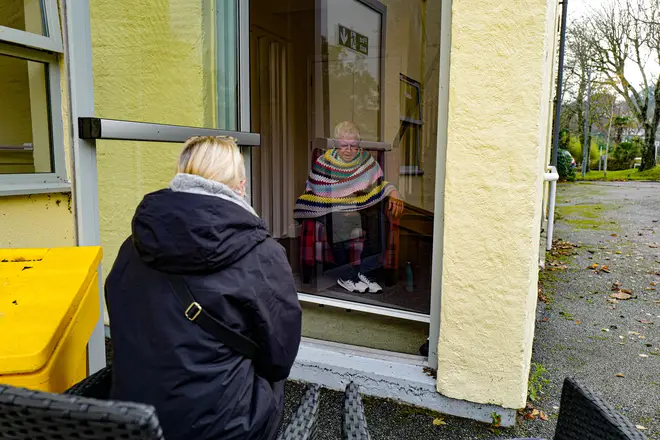
Nick Ferrari 7am - 10am
9 February 2021, 15:25

Relatives of care home residents who provide essential help must be reunited with their loved ones by March, campaigners say.
Six groups are calling for urgent action to reopen care homes in England for meaningful indoor visits "as a matter of safety, common decency, and fundamental human rights".
As a first step, they say this must be in place for visitors who help with the essential care of their loved one by March 1.
Read more: UK arrivals face up to 10 years jail for trying to hide visits to 'red list' countries
They are calling on care providers, relatives and friends, local and national government and the care regulator to "work together to make this a reality".
Age UK, John's Campaign, the National Care Forum, Relatives & Residents, Rights for Residents and Registered Nursing Homes Association have issued a joint statement.

Contact NHS for jabs over-70s told
They say: "If we delay any longer, many residents will have waited more than a year to see and touch their loved ones. This is unacceptable and cannot be allowed to continue.
"The absence of meaningful indoor visiting fails to recognise the fundamental role that relationships and love play in a resident's wellbeing."
The rollout of rapid-result lateral flow tests in the weeks up to Christmas enabled indoor visits in some care homes, with visitors testing negative able to hug their loved ones.
Read more: Coronavirus cases fall dramatically across a number of central London boroughs
Close contact indoor visits are not permitted during the current lockdown, but they can take place outdoors, through windows, in visiting pods, or indoors with a substantial screen.
Last week, the Prime Minister appealed for caution because "far too many" deaths of older people are still occurring.
The Government has said it is looking to ensure a wider range of visiting arrangements are made available "when it is safe to do so".

Care home nurse tells James O'Brien what it's like working in a home
The charities and groups want relatives to be "recognised as central to the person's care; enabled to provide the support crucial to the health and well-being of their loved one; and provided with relevant personal protective equipment (PPE) and testing in line with the safety measures applied to the staff".
They say care homes need to use individualised assessments to balance the risk of harm from the virus with the risk of harm from isolation.
Care homes should also be better supported to enable meaningful visits, they say.
The statement continues: "Ultimately it is impossible to entirely eliminate risk.
"Providers, commissioners, relatives, friends, regulators and the wider public must recognise this as a shared priority - holding a collective responsibility for what we know is right for humanity."
Helen Wildbore, director of the Relatives & Residents Association, said: "Almost a year of isolation is having a devastating impact on older people in care.
"Our helpline hears the distress, despair and heartbreak of separation, and the desperation for a light at the end of the tunnel.
"We must safely reconnect families and friends, to stop the human rights crisis unfolding in care."
Brendan, a helpline caller who has received two vaccine doses, has only had two meaningful visits to see his wife of more than 60 years since England entered lockdown on March 23.
He was able to hug Joan and hold her hand at Christmas, but is now only able to have window visits.
As it is too cold to stand outside, he writes notes telling his wife he loves her and holds them up to the window.
He said: "This is what we are reduced to. The past year has been hell.
"Something must be in place in care homes to let us see our loved ones. I don't care about anything else, only being with Joan."
A Department of Health and Social Care spokesman said: "We know visits to care homes are crucial in supporting the health and wellbeing of residents, which is why we have updated guidance to ensure visits can continue to take place safely during periods of national lockdown."
He added: "While the vaccines provide protection from serious disease, we do not yet know if they prevent someone from passing on the virus to others. This means it is still important to follow the visiting guidance.
"We will do everything possible to make close contact visits possible the moment it is safe to do so."